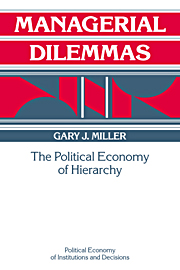
-
Select format
-
- Publisher:
- Cambridge University Press
- Publication date:
- 05 June 2012
- 31 January 1992
- ISBN:
- 9781139173742
- 9780521372817
- 9780521457699
- Dimensions:
- (228 x 152 mm)
- Weight & Pages:
- 0.545kg, 274 Pages
- Dimensions:
- (228 x 152 mm)
- Weight & Pages:
- 0.388kg, 276 Pages
You may already have access via personal or institutional login
Book description
In organisation theory a schism has developed between the traditional organisational behaviour literature, based in psychology, sociology and political science, and the more analytically rigorous field of organisational economics. The former stresses the importance of managerial leadership and cooperation among employees, while the latter focuses on the engineering of incentive systems that will induce efficiency and profitability, by rewarding worker self-interest. In this innovative book, Gary Miller bridges the gap between these literatures. He demonstrates that it is impossible to design an incentive system based on self-interest that will effectively discipline all subordinates and superiors and obviate or overcome the roles of political conflict, collective action, and leadership in an organisation. Applying game theory to the analysis of the roles of cooperation and political leadership in organisational hierarchies, he concludes that the organisation whose managers can inspire cooperation and the transcendence of short-term interest in its employees enjoys a competitive advantage.
Reviews
‘Miller gives a very readable and well organized account of the state of the art in the economics of organization. The book can be highly recommended to those who wish to be given a reliable and well-written access to the subject.’
Manfred Tietzel Source: Journal of Institutional and Theoretical Economics
‘Interesting reading that is sure to raise new questions.’
Source: International Review of Anthropology and Linguistics
Contents
Metrics
Altmetric attention score
Full text views
Full text views help Loading metrics...
Loading metrics...
* Views captured on Cambridge Core between #date#. This data will be updated every 24 hours.
Usage data cannot currently be displayed.
Accessibility standard: Unknown
Why this information is here
This section outlines the accessibility features of this content - including support for screen readers, full keyboard navigation and high-contrast display options. This may not be relevant for you.
Accessibility Information
Accessibility compliance for the PDF of this book is currently unknown and may be updated in the future.


